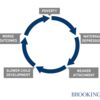0
Research
Community:
Nov 22, 2018
Improved access to health insurance contributed to reducing worry and stress associated with paying rent/mortgage or purchasing meals among low-income people. Expanding health insurance access may have contributed to increasing the disposable income of low income groups.
Authored by: Shiho Kino, Koryu Sato, and Iciro Kawachi for International Journal for Equity in Health
Topics: Affordable Care Act, Health, Housing, Low-income, Medicaid / Medicare, Mental health, Research, Stability
 Shared by Mica O'Brien
Shared by Mica O'Brien
Mica O'Brien posted a
on Mar 7, 2019
Shiho Kino, Koryu Sato, and Iciro Kawachi for International Journal for Equity in Health
Improved access to health insurance contributed to reducing worry and stress associated with paying rent/mortgage or purchasing meals among low-income people. Expanding health insurance access may have contributed to increasing the disposable income of low income groups.
0
News Article
Community:
Mar 5, 2019
In a recently published report called “A Roadmap to Reducing Child Poverty” from the National Academies of Sciences, Engineering and Medicine, its co-authors suggest policy changes that they claim could cut child poverty in half in just 10 years.
Authored by: Rhonda Fanning and Michael Marks for Texas Standard
Topics: Child welfare, Health, Legislation & Policy, Low-income
 Shared by Housing Is
Shared by Housing Is
Housing Is posted a
on Mar 7, 2019
Rhonda Fanning and Michael Marks for Texas Standard
In a recently published report called “A Roadmap to Reducing Child Poverty” from the National Academies of Sciences, Engineering and Medicine, its co-authors suggest policy changes that they claim could cut child poverty in half in just 10 years.
0
Webinar
Community:
Feb 28, 2019
Join us for an examination of how cross-sector data sharing initiatives are being used to tackle tough public health problems. The webinar will provide an in-depth look at a cross-sector collaboration in Illinois between public health, law enforcement, emergency medical services, a fire department and a jail aimed at addressing the needs of high utilizers of behavioral health services.
Authored by: The Network for Public Health Law
Topics: Criminal justice, Data sharing, Health, Mental health, Midwest, Partnerships, Safety, Stability
 Shared by Housing Is
Shared by Housing Is
Housing Is posted a
on Mar 6, 2019
The Network for Public Health Law
Join us for an examination of how cross-sector data sharing initiatives are being used to tackle tough public health problems.
0
Research
Community:
Nov 1, 2018
In this study, researchers conduct a literature review across public health, environmental health, medical, sociology, and urban planning journals to synthesize the research on the mental health effects of rat infestations on residents living in urban neighborhoods.
Authored by: Kaylee Byers, Chelsea G. Himsworth, and Raymond Lam for The Journal of Environmental Health
Topics: Health, Housing, Low-income, Mental health, Research, Safety
 Shared by Housing Is
Shared by Housing Is
Housing Is posted a
on Feb 28, 2019
Kaylee Byers, Chelsea G. Himsworth, and Raymond Lam for The Journal of Environmental Health
In this study, researchers conduct a literature review across public health, environmental health, medical, sociology, and urban planning journals to synthesize the research on the mental health effects of rat infestations on residents living in urban neighborhoods.
0
Report
Community:
Welcome to the Food Research & Action Center’s winter issue of ResearchWire. This quarterly newsletter focuses on the latest research, reports, and resources from government agencies, academic researchers, think tanks, and elsewhere at the intersection of food insecurity, poverty, the federal nutrition programs, and health.
Authored by: Food Research & Action Center (FRAC)
Topics: Child welfare, Food insecurity, Funding, Health, Legislation & Policy, Low-income, Nutrition, Research, Youth
 Shared by Mica O'Brien
Shared by Mica O'Brien
Mica O'Brien posted a
on Feb 28, 2019
Food Research & Action Center (FRAC)
Welcome to the Food Research & Action Center’s winter issue of ResearchWire.
0
Video
Community:
Feb 20, 2019
With the active support of their residents, HABG converted a 34-passenger bus donated by Warren County Public Schools. The new mobile grocery store will offer fresh fruits and vegetables to families who currently live in a 'food desert' where the cost of eating healthy can be beyond their reach.
HAGB's new mobile grocery store will visit public housing developments and other low-income neighborhoods in Bowling Green to help residents lower their food costs by offering affordable groceries, including fresh produce grown at HAGB. More than 90 residents were surveyed and almost everyone said they would use the mobile grocery store at least once weekly.
Authored by: Housing Authority of Bowling Green
Topics: Food insecurity, Health, Housing, Low-income, Nutrition, Place-based
 Shared by Housing Is
Shared by Housing Is
Housing Is posted a
on Feb 28, 2019
Housing Authority of Bowling Green
With the active support of their residents, HABG converted a 34-passenger bus donated by Warren County Public Schools.
0
News Article
Community:
Feb 14, 2019
This week, the Food Research & Action Center in Washington, D.C., published its annual School Breakfast Scorecard, analyzing school breakfast participation throughout the country for the 2017-2018 school year. Here are six things to know from the report.
Authored by: Benita Gingerella for Food Service Director
Topics: Early childhood, Education, Food insecurity, Health, Nutrition, Youth
 Shared by Housing Is
Shared by Housing Is
Housing Is posted a
on Feb 25, 2019
Benita Gingerella for Food Service Director
This week, the Food Research & Action Center in Washington, D.C., published its annual School Breakfast Scorecard, analyzing school breakfast participation throughout the country for the 2017-2018 school year. Here are six things to know from the report.
0
Case study
Community:
This is a summary of HealthInfoNet’s (HIN) recommendations to pursue the integration of Maine’s Homeless Information Management System (HMIS) with Maine’s statewide Health
Information Exchange (HIE).
Authored by: HealthInfoNet and Data Across Sectors for Health (DASH)
Topics: Data sharing, East Coast, Health, Homelessness, Housing, Partnerships
 Shared by Mica O'Brien
Shared by Mica O'Brien
Mica O'Brien posted a
on Feb 20, 2019
HealthInfoNet and Data Across Sectors for Health (DASH)
This is a summary of HealthInfoNet’s (HIN) recommendations to pursue the integration of Maine’s Homeless Information Management System (HMIS) with Maine’s statewide Health
Information Exchange (HIE).
0
Case study
Community:
In 2018, Penobscot Community Health Care (PCHC), a Federally Qualified Health Center and The Hope House Health and Living Center in Bangor began a unique collaboration between health care and homelessness services utilizing HealthInfoNet’s Analytics and Reporting Platform (HARP). This tool identifies patients at high-risk for readmissions and connecting them to appropriate community and health services to prevent readmissions.
Authored by: HealthInfoNet and Penobscot Community Health Care (PCHC)
Topics: East Coast, Health, Homelessness, Housing, Partnerships
 Shared by Mica O'Brien
Shared by Mica O'Brien
Mica O'Brien posted a
on Feb 20, 2019
HealthInfoNet and Penobscot Community Health Care (PCHC)
In 2018, Penobscot Community Health Care (PCHC), a Federally Qualified Health Center and The Hope House Health and Living Center in Bangor began a unique collaboration between health care and homelessness services utilizing HealthInfoNet’s Analytics and Reporting Platform (HARP).
0
Policy Brief
Community:
This annotated resource compilation is intended to help state and local agencies access information and resources needed to better understand the federal legal protections and requirements associated with datasets collected by federal agencies or as part of a federally funded program.
Authored by: The Network for Public Health Law
Topics: Data sharing, Disabilities, Early childhood, Education, Health, Homelessness, Legislation & Policy, Post-secondary
 Shared by Mica O'Brien
Shared by Mica O'Brien
Mica O'Brien posted a
on Feb 20, 2019
The Network for Public Health Law
This annotated resource compilation is intended to help state and local agencies access information and resources needed to better understand the federal legal protections and requirements associated with datasets collected by federal agencies or as part of a federally funded program.
0
Publication
Community:
To help support this infrastructure, public health should more widely use de-identification to make more timely, reliable, sub-county and actionable data available. Understanding the benefits of utilizing de-identified data and the mechanics of disclosing it are matters of national priority. The De-Identification Toolkit is intended for a broad audience of health officials, community organizations, privacy officers, public health practitioners, data managers and their attorneys.
Authored by: The Network for Public Health Law
Topics: Data sharing, Health, Partnerships
 Shared by Mica O'Brien
Shared by Mica O'Brien
Mica O'Brien posted a
on Feb 20, 2019
The Network for Public Health Law
To help support this infrastructure, public health should more widely use de-identification to make more timely, reliable, sub-county and actionable data available. Understanding the benefits of utilizing de-identified data and the mechanics of disclosing it are matters of national priority.
0
Publication
Community:
Jan 1, 2019
The purpose of this guide is to provide interested health departments with the key components to consider before planning the Foundational Public Health Services (FPHS) implementation process. It is based on learnings from four states that have been implementing this work, with support from the Public Health National Center for Innovations (PHNCI), over the past several years.
Authored by: Public Health National Center for Innovations (PHNCI)
Topics: Data sharing, Health, Partnerships
 Shared by Mica O'Brien
Shared by Mica O'Brien
Mica O'Brien posted a
on Feb 20, 2019
Public Health National Center for Innovations (PHNCI)
The purpose of this guide is to provide interested health departments with the key components to consider before planning the Foundational Public Health Services (FPHS) implementation process.
0
Infographics
Community:
Recently, several of the BUILD communities approached us with a seemingly straightforward question about how many housing inspectors other cities have to enforce their rental codes and protect residents from unsafe housing. They intended to use this information to better understand the role housing inspectors play within different communities, since they are often a major stakeholder in identifying and addressing building related issues that directly impact the health of residents (e.g., chronic asthma).
Authored by: Emily Yu for The BUILD Health Challenge
Topics: Asthma, Health, Housing, Research, Safety
 Shared by Mica O'Brien
Shared by Mica O'Brien
Mica O'Brien posted a
on Feb 20, 2019
Emily Yu for The BUILD Health Challenge
Recently, several of the BUILD communities approached us with a seemingly straightforward question about how many housing inspectors other cities have to enforce their rental codes and protect residents from unsafe housing.
0
Podcast
Community:
This episode features Martin Love, CEO and Jessica Osborne-Stafsnes, Program Manager at the North Coast Health Improvement and Information Network (NCHIIN) – a non-profit health information exchange in Humboldt County, CA. NCHIIN focuses on exchanging information across multiple sectors – including social care, medical care, behavioral health, criminal justice, education and more – to support care coordination and improve health. As an awardee of DASH CIC-START, NCHIIN worked with partners to add new organizations, sectors, and data streams to ACT.md, their care coordination and alerts notification system. They provided insights about engaging partners to incorporate the system into their workflows to provide more holistic care for patients, especially those with complex health and social needs.
Authored by: All In: Data for Community Health
Topics: Criminal justice, Data sharing, Education, Health, Mental health, Partnerships, West Coast
 Shared by Mica O'Brien
Shared by Mica O'Brien
Mica O'Brien posted a
on Feb 20, 2019
All In: Data for Community Health
This episode features Martin Love, CEO and Jessica Osborne-Stafsnes, Program Manager at the North Coast Health Improvement and Information Network (NCHIIN) – a non-profit health information exchange in Humboldt County, CA.
0
Publication
Community:
Jan 17, 2019
The North Coast Health Improvement and Information Network (NCHIIN) was funded by DASH CIC-START to add new partners, sectors, mental health client summary data, and facility alerts to ACT.md, the care coordination and alerts notification system in Humboldt County, CA. As part of their CIC-START project, NCHIIN developed this document, which provides a methodology for onboarding new organizations, data streams, and sectors into the ACT.md platform.
Authored by: Data Across Sectors for Health (DASH)
Topics: Criminal justice, Data sharing, Health, Mental health, Partnerships, Substance abuse
 Shared by Mica O'Brien
Shared by Mica O'Brien
Mica O'Brien posted a
on Feb 20, 2019
Data Across Sectors for Health (DASH)
The North Coast Health Improvement and Information Network (NCHIIN) was funded by DASH CIC-START to add new partners, sectors, mental health client summary data, and facility alerts to ACT.md, the care coordination and alerts notification system in Humboldt County, CA.
0
Case study
Community:
The Addressing Healthcare’s Blindside in Albuquerque’s South Side (AHBASS) collaborative participated in the BUILD Health Challenge’s first cohort with the intention of “making the healthy choice, the easy choice” for community members. Now you can learn about their strategies, approaches, application of the BUILD principles, and outcomes in this new case study documenting their work. Follow along in this case study and see how this Albuquerque, NM, based team addressed chronic disease and self-management in their community. Together, they established a multi-sector collaboration that resulted in a referral tracking system and a Mobile Farmers Market. In addition, the team implemented the Healthy Here Wellness Referral Center, an integrated chronic disease management referral system to link clinics to community resources in order to improve health outcomes.
Authored by: The BUILD Health Challenge
Topics: Data sharing, Food insecurity, Health, Low-income, Nutrition, Partnerships
 Shared by Mica O'Brien
Shared by Mica O'Brien
Mica O'Brien posted a
on Feb 20, 2019
The BUILD Health Challenge
The Addressing Healthcare’s Blindside in Albuquerque’s South Side (AHBASS) collaborative participated in the BUILD Health Challenge’s first cohort with the intention of “making the healthy choice, the easy choice” for community members.
0
Report
Community:
Sep 4, 2018
This series of papers provides an overview and framework for reaching out to stakeholders or potential partners from other sectors that may share your interest in collaborating and sharing data to improve community health. Knowing your audience will help your collaboration craft a successful and productive outreach strategy, strengthen your partnerships, and ensure ongoing sustainability by clearly defining and articulating the value of sharing data across sectors.
Authored by: Data Across Sectors for Health (DASH)
Topics: Criminal justice, Health, Homelessness, Housing, Medicaid / Medicare, Partnerships
 Shared by Mica O'Brien
Shared by Mica O'Brien
Mica O'Brien posted a
on Feb 20, 2019
Data Across Sectors for Health (DASH)
This series of papers provides an overview and framework for reaching out to stakeholders or potential partners from other sectors that may share your interest in collaborating and sharing data to improve community health.
0
Report
Community:
Feb 19, 2019
Integrating health care data with data from other sectors helps address the holistic needs of individual patients while informing the development of population-level programs and policies that can improve outcomes, both in health care and other sectors. This paper provides guidance for those in non-health care sectors (e.g. housing, social services, community-based organizations) on effectively engaging and advancing conversations with health care stakeholders about collaborating to share data, focusing on the specific stakeholder of hospitals/health systems.
Authored by: Data Across Sectors for Health (DASH)
Topics: Health, Housing, Low-income, Medicaid / Medicare, Partnerships
 Shared by Mica O'Brien
Shared by Mica O'Brien
Mica O'Brien posted a
on Feb 20, 2019
Data Across Sectors for Health (DASH)
Integrating health care data with data from other sectors helps address the holistic needs of individual patients while informing the development of population-level programs and policies that can improve outcomes, both in health care and other sectors.
0
News Article
Community:
Feb 19, 2019
A glossary for the emerging Democratic health care debate.
Authored by: Margot Sanger-Katz for The New York Times
Topics: Health, Legislation & Policy, Low-income, Medicaid / Medicare, Seniors
 Shared by Mica O'Brien
Shared by Mica O'Brien
Mica O'Brien posted a
on Feb 19, 2019
Margot Sanger-Katz for The New York Times
A glossary for the emerging Democratic health care debate.
0
Report
Community:
Feb 13, 2019
More low-income children across the country are getting the nutrition they need to learn and thrive through the School Breakfast Program, according to the annual School Breakfast Scorecard, released by the Food Research & Action Center (FRAC).
Authored by: Food Research & Action Center (FRAC)
Topics: Child welfare, Food insecurity, Health, Low-income, Nutrition
 Shared by Housing Is
Shared by Housing Is
Housing Is posted a
on Feb 14, 2019
Food Research & Action Center (FRAC)
More low-income children across the country are getting the nutrition they need to learn and thrive through the School Breakfast Program, according to the annual School Breakfast Scorecard, released by the Food Research & Action Center (FRAC).
0
Report
Community:
Jan 24, 2019
The purpose of this paper is to examine barriers to the integration of clinical health care and mental health services, and to identify policy options for consideration in advancing integration of services.
Authored by: Bipartisan Policy Center
Topics: Health, Mental health, Preventative care, Research, Substance abuse
 Shared by Mica O'Brien
Shared by Mica O'Brien
Mica O'Brien posted a
on Feb 12, 2019
The purpose of this paper is to examine barriers to the integration of clinical health care and mental health services, and to identify policy options for consideration in advancing integration of services.
0
Publication
Community:
Feb 1, 2019
While there are many examples of small-scale programs that have integrated care and financing for Medicare-Medicaid eligible individuals, implementation at large scale has been elusive, often limited by concerns that savings will not materialize. The Medicare-Medicaid Coordination Office with its Financial Alignment Demonstration was specifically created to allow states to step forward and develop models that could substantially improve care for beneficiaries while delivering savings to states and the federal programs.We are now six years into this audacious set of pilots, which involve 12 states and nearly 440,000 people.
Authored by: Bruce A. Chernof for Milbank Memorial Fund
Topics: Health, Legislation & Policy, Low-income, Medicaid / Medicare, Research
 Shared by Mica O'Brien
Shared by Mica O'Brien
Mica O'Brien posted a
on Feb 7, 2019
Bruce A. Chernof for Milbank Memorial Fund
While there are many examples of small-scale programs that have integrated care and financing for Medicare-Medicaid eligible individuals, implementation at large scale has been elusive, often limited by concerns that savings will not materialize.
0
Publication
Community:
Jan 18, 2019
The State of Arizona’s Medicaid agency (AHCCCS) recognizes the vital importance of safe, decent and affordable housing to health. With a portfolio of over 3,000 units of affordable housing for Medicaid members with a determination of serious mental illness (SMI) and/or substance use disorder, housing is a major component of how the State of Arizona assists those trying to recover and stabilize.
Authored by: Josh Crites for The Journal of Housing & Community Development
Topics: Health, Housing, Low-income, Medicaid / Medicare, Partnerships, Place-based
 Shared by Mica O'Brien
Shared by Mica O'Brien
Mica O'Brien posted a
on Feb 7, 2019
Josh Crites for The Journal of Housing & Community Development
The State of Arizona’s Medicaid agency (AHCCCS) recognizes the vital importance of safe, decent and affordable housing to health.
0
Report
Community:
Jan 31, 2019
For a very young child, the relationship with a primary caregiver, most often though not exclusively a mother, lays an important psychological foundation for later flourishing. Successful attachment and bonding in the first two years of life predicts healthy later development on a range of fronts, from mental health to educational skills. When bonding and attachment prove difficult, child development is affected. Recent advances in brain science allow this impact to be shown more clearly and more definitively.
Authored by: Richard V. Reeves for Brookings Institution
Topics: Child welfare, Depression, Dual-generation, Early childhood, Health, Low-income, Mental health, Mobility
 Shared by Mica O'Brien
Shared by Mica O'Brien
Mica O'Brien posted a
on Feb 5, 2019
Richard V. Reeves for Brookings Institution
For a very young child, the relationship with a primary caregiver, most often though not exclusively a mother, lays an important psychological foundation for later flourishing.
0
Webinar
Community:
Jul 17, 2018
Featuring Ellen Childs, PhD, from Boston University School of Public Health and Vaughan Rees, PhD, from Harvard T.H. Chan School of Public Health.
Authored by: Building Success
Topics: Health, Housing, Legislation & Policy, Smoke-free
 Shared by Housing Is
Shared by Housing Is
Housing Is posted a
on Feb 4, 2019
Featuring Ellen Childs, PhD, from Boston University School of Public Health and Vaughan Rees, PhD, from Harvard T.H. Chan School of Public Health.

 Shared by Housing Is
on Mar 7, 2019
Shared by Housing Is
on Mar 7, 2019


 Shared by Housing Is
on Mar 6, 2019
Shared by Housing Is
on Mar 6, 2019

 Shared by Housing Is
on Feb 28, 2019
Shared by Housing Is
on Feb 28, 2019
 Shared by Housing Is
on Feb 28, 2019
Shared by Housing Is
on Feb 28, 2019
 Shared by Housing Is
on Feb 25, 2019
Shared by Housing Is
on Feb 25, 2019


 Shared by Housing Is
on Feb 14, 2019
Shared by Housing Is
on Feb 14, 2019


 Shared by Housing Is
on Feb 4, 2019
Shared by Housing Is
on Feb 4, 2019



